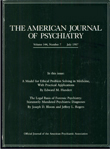Religiosity and Remission of Depression in Medically Ill Older Patients
Abstract
OBJECTIVE: The effects of religious belief and activity on remission of depression were examined in medically ill hospitalized older patients. METHOD: Consecutive patients aged 60 years or over who had been admitted to medical inpatient services at a university medical center were screened for depressive symptoms. Of 111 patients scoring 16 or higher on the Center for Epidemiologic Studies Depression Scale, 94 were diagnosed with depressive disorder (DSM-III major depression or subsyndromal depression) by a psychiatrist using a structured psychiatric interview. After hospital discharge, depressed patients were followed up by telephone at 12-week intervals four times. At each follow-up contact, criterion symptoms were reassessed, and changes in each symptom over the interval since last contact were determined. The median follow-up time for 87 depressed patients was 47 weeks. Religious variables were examined as predictors of time to remission by means of a multivariate Cox model, with controls for demographic, physical health, psychosocial, and treatment factors. RESULTS: During the follow-up period, 47 patients (54.0%) had remissions; the median time to remission was 30 weeks. Intrinsic religiosity was significantly and independently related to time to remission, but church attendance and private religious activities were not. Depressed patients with higher intrinsic religiosity scores had more rapid remissions than patients with lower scores. CONCLUSIONS: In this study, greater intrinsic religiosity independently predicted shorter time to remission. To the authors' knowledge, this is the first report in which religiosity has been examined as a predictor of outcome of depressive disorder.



